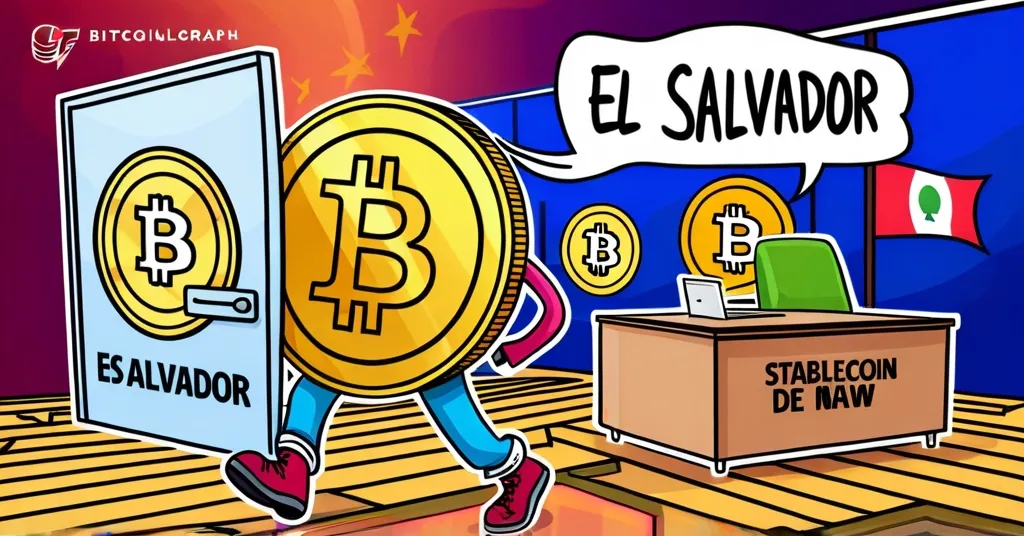Tether Moves HQ to El Salvador, Embracing Bitcoin-Friendly Policies

Tether Relocates to El Salvador: A Strategic Move for Future-Focused Regulation
Tether, the leading stablecoin issuer, has made a bold move in relocating its headquarters to El Salvador, the first country to embrace Bitcoin as legal tender. This strategic shift is set to leverage El Salvador’s supportive regulatory environment and Bitcoin-friendly policies, enhancing Tether’s mission of global Bitcoin and stablecoin adoption.
- Tether relocates to El Salvador, securing DASP licenses
- First offline headquarters established in the country
- Move aligns with El Salvador’s vision as a digital asset hub
On January 13, Tether announced its relocation, a decision that marks a significant step in aligning with a nation that has already embraced the future of finance. Tether, previously licensed in the British Virgin Islands (BVI), secured the necessary Digital Asset Service Provider (DASP) licenses from El Salvador’s National Digital Assets Commission (CNAD) last August. This move includes setting up Tether’s first offline headquarters, signaling a commitment to fostering financial inclusion and innovation. For those unfamiliar, a DASP is a regulatory classification for businesses offering digital asset services, and an offline headquarters refers to a physical office location, not just a virtual presence.
The relocation to El Salvador is not merely a change of address. It’s a strategic move designed to take advantage of a regulatory environment that is conducive to Tether’s goals. Paolo Ardoino, Tether’s CEO, expressed his enthusiasm, stating, “El Salvador is a beacon of innovation in the digital asset space. By rooting ourselves here, we aim to support global communities and drive financial inclusion through Bitcoin and stablecoin adoption.” For those new to the crypto world, stablecoins are cryptocurrencies designed to have a stable value, often pegged to a fiat currency like the US dollar, serving as a bridge between traditional finance and the crypto ecosystem.
Financially, Tether’s impact is significant. Matthew Sigel, Head of Digital Asset Research at VanEck, highlighted that “Tether generated $10 billion in net income last year, equivalent to 35% of El Salvador’s GDP.” This figure underscores the potential economic boost Tether could bring to El Salvador, especially with the country’s new ICT Innovation Law offering a 15-year exemption on income, property, and capital gains taxes for blockchain and tech companies. This law aims to promote digital asset transactions and issuances, making El Salvador an attractive location for such companies.
This relocation is a clear endorsement of El Salvador’s vision as a pioneer in digital financial innovation. It’s a mutually beneficial arrangement where Tether gains a conducive environment to further its mission, and El Salvador strengthens its position as a global hub for digital assets. However, while we celebrate this move, it’s crucial to remain grounded. Tether’s past has not been without controversy, particularly regarding its reserves and transparency. As Tether sets up shop in El Salvador, it will be essential to watch how it navigates these issues under a new regulatory framework. The promise of financial innovation must be balanced with the reality of maintaining trust and stability in the ecosystem.
From a Bitcoin maximalist perspective, while Tether’s move to El Salvador supports the broader crypto ecosystem, it’s worth noting that Bitcoin remains the cornerstone of this revolution. Tether’s stablecoin serves a vital role, but it’s Bitcoin that truly embodies the principles of decentralization and financial sovereignty that many in the crypto space champion. Yet, we must also acknowledge the role that other cryptocurrencies and blockchain technologies play. Ethereum, for instance, has its own strengths in smart contracts and decentralized applications, filling niches that Bitcoin might not serve. The crypto world is diverse, and each piece, including stablecoins like Tether, contributes to the larger picture of financial revolution.
As we look to the future, Tether’s move to El Salvador could be a harbinger of more companies following suit, seeking jurisdictions that not only welcome but actively support blockchain innovation. This could lead to a new wave of economic development in regions like El Salvador, catalyzed by the influx of tech and blockchain enterprises. However, let’s not get carried away with the hype. The cryptocurrency space is fraught with challenges, including regulatory uncertainties and market volatility. Tether’s move to El Salvador should be seen as a strategic decision aimed at enhancing its operations and contributing to global financial inclusion, but it’s not a silver bullet for all the industry’s woes.
El Salvador’s embrace of Bitcoin has set a precedent, and now with Tether’s presence, the country might soon be known as the “Silicon Valley of Stablecoins.” But is El Salvador betting its future on a company with a controversial past? Only time will tell. Yet, this move could propel El Salvador into a new era of economic growth, driven by the principles of decentralization, freedom, and effective accelerationism that the crypto world champions.
Key Takeaways and Questions
- What prompted Tether to relocate to El Salvador?
Tether was attracted to El Salvador due to its forward-thinking policies, favorable regulatory environment, and Bitcoin-friendly community, which align with Tether’s mission to promote global Bitcoin and stablecoin adoption.
- What benefits does Tether expect from its move to El Salvador?
Tether expects to leverage supportive regulatory frameworks, explore innovative solutions, and expand efforts to promote Bitcoin and stablecoin adoption in underbanked regions, benefiting from tax incentives under El Salvador’s ICT Innovation Law.
- How does Tether’s relocation impact its global operations?
The relocation does not affect Tether’s operations in Lugano, Switzerland, but signifies a strategic focus on emerging markets and solidifies El Salvador’s role as a leader in digital financial innovation.
- What does Tether’s move signify for El Salvador’s economy?
Tether’s $10 billion net income last year, equivalent to 35% of El Salvador’s GDP, suggests a significant economic impact, further supported by tax incentives that encourage blockchain and tech companies to establish operations in the country.
- How does this move align with Tether’s mission?
The move aligns with Tether’s mission to empower individuals and businesses through Bitcoin and stablecoins, supporting global communities and driving financial inclusion.
“We take pride in establishing our headquarters in a jurisdiction that embraces innovation and supports our long-term vision.” – Tether
“El Salvador is a beacon of innovation in the digital asset space. By rooting ourselves here, we aim to support global communities and drive financial inclusion through Bitcoin and stablecoin adoption.” – Paolo Ardoino, Tether CEO
“Tether generated $10 billion in net income last year, equivalent to 35% of El Salvador’s GDP.” – Matthew Sigel, Head of Digital Asset Research at VanEck



